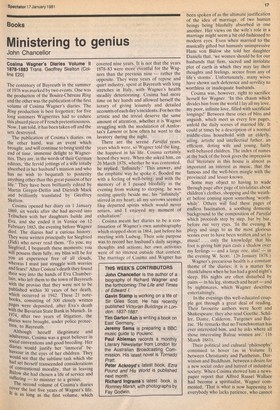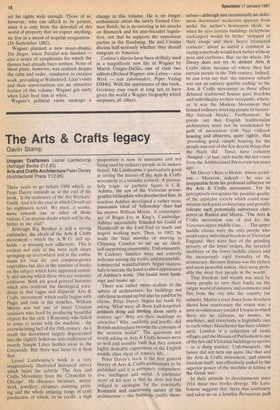Books
Ministering to genius
John Chancellor
Cosima Wagner's Diaries Volume II 1878-1883 Trans. Geoffrey Skelton (Collins £20) The centenary of Bayreuth in the summer of 1976 was marked by two events. One was the production of the Boulez-Chereau Ring and the other was the publication of the first volume of Cosima Wagner's diaries. The Ring production is best forgotten; for five long summers Wagnerites had to endure this absurd piece of French pretentiousness. Now, I am told, it has been taken off and the sets destroyed.
The publication of Cosima's diaries, on the other hand, was an event which brought, and will continue to bring until the end of time, immense delight to Wagnerites. They are, in the words of their German editors, 'the fervid jottings of a wife totally absorbed in her husband's mission and who has no wish to bequeath to posterity anything other than this great passion of her life.' They have been brilliantly edited by Martin Gregor-Dellin and Dietrich Mack and brilliantly translated by Geoffrey Skelton.
Cosima opened her diary on 1 January 1869, six weeks after she had moved into Tribschen with her daughters lsolde and Eva, and she ended it in Venice on 12 February 1883, the evening before Wagner died. The diaries had a curious history. They were written principally for Siegfried (Fidi) who never read them. 'To you, my Siegfried, I bequeath these moments; you Will possess them fully, my bliss will be for You an experience free of all clouds, Whereas I must just struggle with worries and fears!' After Cosiina's death they found their way into the hands of Eva Chamberlain, who left them to the town of Bayreuth With the proviso that they were not to be published within 30 years of her death, Which occurred in 1942. These 21 notebooks, consisting of 500 closely written -Pi.iges were deposited, after Eva's death With the Bavarian State Bank in Munich. In 1974, after two years of litigation, the diaries were brought, under police protection, to Bayreuth. Although herself illegitimate and adulterous, Cosima was a great believer, in social conventions and good breeding. Her dtanes would justify her 'immoral' behaviour in the eyes of her children. They would see that the sublime task which she had set herself transcended considerations 0...f.. conventional morality, that in leaving Uolow she had chosen a life of service and suffering — to minister to a genius. The second volume of Cositna's diaries _cover the last five years of Wagner's life. It is as long as the first volume, which covered nine years.. It is not that the years 1878-83 were more .eventful for the Wagners than the previous nine — rather the opposite. They were years of repose and quiet industry, spent at Bayreuth with long stretches in Italy, with • Wagner's health steadily deteriorating. Cosima had more time on her hands and allowed herself the luxury of giving leisurely and detailed accounts of each day's incidents. For her the artistic and the trivial deserve the same amount of attention, whether it is Wagner struggling with the modulation of Amfortas's Lament or how often he went to the lavatory during the night.
There are the serene Parsifni years. years which were, so Wagner told the king. the happiest in his life. Cosima certainly hoped they were. When she asked him, on 26 March 1878, whether he was contented, he replied. 'Infinitely.' This answer, and the emphatic way he spoke it, flooded me with a feeling of well-being, and with the memory of it I passed blissfully in the evening from waking to sleeping; he was resting quietly beside me, his "infinitely" stirred in My heart; all my sorrows seemed lik departed spirits which would never return, and I enjoyed my moment of exhaltation !'
Cosima meant her diaries to be a continuation of Wagner's own, autobiography which stopped short in 1864, just before his meeting with Ludwig. Their sole purpose was to record her .husband's daily sayings. thoughts and actions: her own activities were of no interest outside that context. The marriage of Cosima and Wagner has been spoken of as the ultimate justification of the idea of marriage, of two human beings being blissfully absorbed in one another. Her views on the wife's role in a marriage might seem a bit old-fashioned to modern eyes. Even when married to the musically gifted but humanly unimpressive Hans von Billow she told her daughter Daniela that, 'we women should be for our husbands that firm, sacred and inviolate plot of earth in which they may lay their thoughts and feelings, secure from any of life's storms'. Unfortunately, many wives have shown such deference and servility to worthless or inadequate husbands.
Cosima was, however, right to sacrifice herself for Wagner. 'In this chasm which divides him from the world I lay all my love, my poor, infinite love, filled with sacrificial longings!' Between these cries of bliss and anguish, which meet us every few pages, unfold the daily scenes of married life. It could at times be a description of a normal middle-class household • with an elderly, ailing, artistic and intellectual father, an efficient, doting wife and young, fairly well-behaved children. The index of names • at the back of the book gives the impression that literature in this house is almost as important an interest as music, that the famous and the well-born mingle with the provincial and lesser-known.
Some may object to having to wade through page after page of trivialities about children's clothes, shopping and the weather before coming upon something 'worthwhile'. Others will find these pages of endless fascination, a soothing domestic background to the composition of Parsifal which proceeds step by step. bar by bar, before our very eyes. 'In the evening R playns and sings to us the most glorious scenes ever to have been written and set to music! . . . only the knowledge that his foot is giving him 'pain casts a shadow over my feelings — and a large one, alas! — in the evening W. Scott.' (26 January 1878,) Wagner's precarious health is a constant theme of the diaries; it is a matter for thankfulness when he has had a good night's sleep. His nights are often disturbed by pains—in his leg, stomach and heart and by nightmares, which Wagner describes entertainingly, In the evenings this well-educated couppie got through a great deal of reading. Their favourite authors were Scott and Shakespeare; they also read Goethe. Schiller. Dante. Calderon, Turgenev and Balzac. 'He remarks that no Frenchwoman has ever interested him. and he asks where all those interesting Balzac women are.' (16 March 1881).
Their political and cultural 'philosophy' continued to hover (as in Volume I) between Christianity and Pantheism. Darwinism and Buddhism. between a desire,. for a new social order and hatred of industrial society. When Cosima showed him a newspaper report that Alfred Russel Wallace had become a spiritualist. Wagner commented, 'That is what is now happening to everybody who lacks patience, who cannot set his sights wide enough. Those of us, however, who can afford to be patient, since it is only from the downfall of this world of property that we expect anything, we live in -a mood of hopeful resignation.' (16 September 1882).
Wagner planned a new music-drama, Die Sieger, when Parsifal was finished — also a series of symphonies for which the themes had already been written, None of these plans, however, was realised despite the calm and order, conducive to creative work, prevailing at Wahnfried. Liszt's visits and their conversations are an attractive feature of this volume; Wagner got nasty when Liszt beat him at whist.
Wagner's political views undergo a change in this volume. He is no longer enthusiastic about the newly formed German Reich; he is devastating in his attacks on Bismarck and his anti-Socialist legislation, not that he supports the opposition parties in the Reichstag. He and Cosima discuss half-seriously whether they should emigrate to America.
Cosima's diaries have been skilfully used in a magnificent new life of Wagner by Martin Gregor-Dellin, one of their two editors (Richard Wagner: seen Leben—sein Werk — sein Jahrhunderl, Piper Verlag DM46). With the appearance of this book, Germany may claim at long last to have given the world a Wagner biography which surpasses all others.



































 Previous page
Previous page